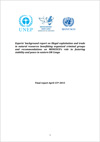-
European Parliament Passes Conflict-Minerals Bill; UN Releases Report on Money Flows in DRC
June 18, 2015 By Carley Chavara A new report prepared by the UN Environment Program and UN peacekeeping operation in the Democratic Republic of Congo (known as MONUSCO) found that just two percent of the total value of illicit natural resources smuggled from the country comes back to armed groups. Still, these funds, which amount to around $13 million a year, allow some 25 to 49 groups to continue operating in the country’s war-torn eastern provinces. Much more, as much as 50 percent, ends up in the hands of transnational criminal networks with the remaining profits flowing to individuals or companies elsewhere in the DRC or in Uganda, Rwanda, and Burundi. Following waning support for revolutionary agendas, today’s insurgency movements are no longer about politics but minerals and other valuable resources, says the report. While gold revenues still constitute the largest share of criminal funding relative to other resources, the report found timber is just as profitable as diamonds and charcoal is more profitable than tin, tungsten, and tantalum combined. This shift most likely reflects the growing demand for firewood in the region and brings into question the effectiveness of certifications schemes and other efforts to track natural resource revenues which are limited to diamonds and other minerals.
A new report prepared by the UN Environment Program and UN peacekeeping operation in the Democratic Republic of Congo (known as MONUSCO) found that just two percent of the total value of illicit natural resources smuggled from the country comes back to armed groups. Still, these funds, which amount to around $13 million a year, allow some 25 to 49 groups to continue operating in the country’s war-torn eastern provinces. Much more, as much as 50 percent, ends up in the hands of transnational criminal networks with the remaining profits flowing to individuals or companies elsewhere in the DRC or in Uganda, Rwanda, and Burundi. Following waning support for revolutionary agendas, today’s insurgency movements are no longer about politics but minerals and other valuable resources, says the report. While gold revenues still constitute the largest share of criminal funding relative to other resources, the report found timber is just as profitable as diamonds and charcoal is more profitable than tin, tungsten, and tantalum combined. This shift most likely reflects the growing demand for firewood in the region and brings into question the effectiveness of certifications schemes and other efforts to track natural resource revenues which are limited to diamonds and other minerals.The European Parliament recently passed major legislation that builds on U.S. efforts to prevent illicit conflict minerals from entering the global market, but makes some important changes. “Studies on the ground show that Dodd-Frank [the U.S. bill] did not have a conflict-free effect but it had a Congo-free effect,” said Iuliu Winkler, rapporteur on conflict minerals for the Committee on International Trade at a press conference. The law compels nearly 880,000 European companies “upstream” of the extraction process to disclose whether their supply chains contain illegally sourced tin, tungsten, tantalum, or gold and requires rigorous third-party audits of all metal smelters and gold refineries. It also includes provisions for on-the-ground capacity building for communities impacted by the regulations, including development aid and assistance in marketing non-conflict minerals. The hope is to avoid shutting out legitimate sources from the DRC who aren’t able to comply with the bill’s requirements, as was the critique of the Dodd-Frank act.
Sources: European Parliament, Mission de l’Organisation des Nations Unies en République démocratique du Congo, UN Environment Program.
Topics: Africa, biofuels, Burundi, conflict, consumption, development, DRC, economics, energy, environment, environmental security, Europe, European Union, foreign policy, forests, international environmental governance, livelihoods, military, minerals, natural resources, Reading Radar, Rwanda, security, Uganda, wildlife trafficking
 A Publication of the Stimson Center.
A Publication of the Stimson Center.





